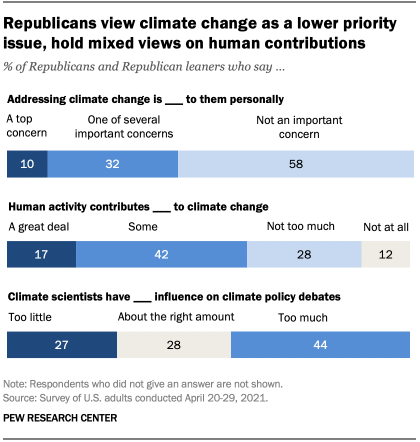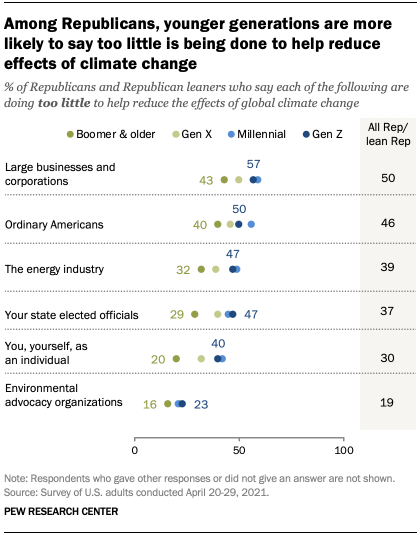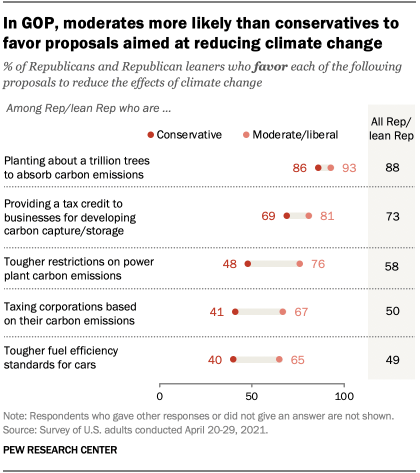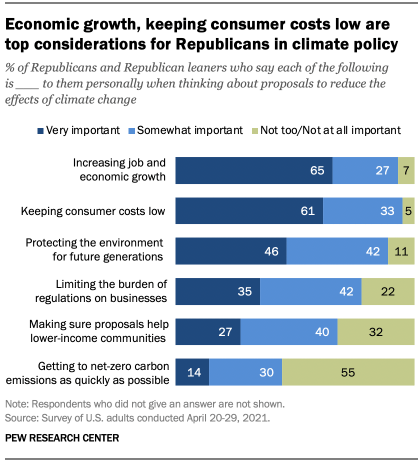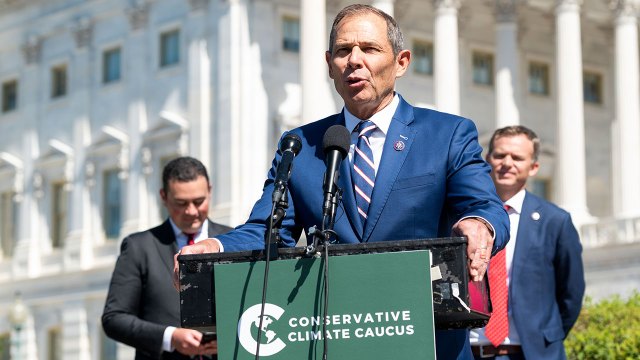
Climate change remains a low-priority issue for Americans who identify as Republican or lean toward the Republican Party. At the same time, Republicans express openness to certain policy proposals to deal with climate change. And there are differences in views within the GOP, with moderates and younger adults generally offering higher levels of support for action to address climate change than conservatives and older adults.
Few Republicans and Republican-leaning independents express deep concern about addressing climate change: Only 10% call it a top personal concern, compared with a much larger share of Democrats and Democratic leaners (49%), according to a recent Pew Research Center survey of U.S. adults. In last year’s presidential election, just 11% of those who supported Donald Trump said climate change was very important to their vote. By contrast, a majority of Joe Biden’s supporters (68%) described climate change as a very important issue.
Pew Research Center conducted this study to understand how Americans view climate, energy and environmental issues. We surveyed 13,749 U.S. adults from April 20 to 29, 2021.
The survey was conducted on Pew Research Center’s American Trends Panel (ATP) and included an oversample of adults ages 18 to 24 from the Ipsos Knowledge Panel. A total of 912 Generation Z adults, born after 1996, were included in the sample.
Respondents on both panels are recruited through national, random sampling of residential addresses. This way nearly all U.S. adults have a chance of selection. The survey is weighted to be representative of the U.S. adult population by gender, race, ethnicity, partisan affiliation, education and other categories. Read more about the ATP’s methodology. Here are the questions used for this report, along with responses, and its methodology.
Republicans by and large do not see a strong link between human activity and climate change: Just 17% say human activities – such as burning fossil fuels – contribute a great deal to climate change. About four-in-ten (42%) say human activity contributes some to climate change, while 28% say it contributes not too much and 12% say not at all.
Amid warnings from scientists and climate activists about climate impacts, there has been little increase in the share of Republicans who see climate change as a threat to the country over the last decade, in contrast to rising levels of concern among Democrats.
Republicans express a degree of skepticism toward climate scientists. Greater shares say climate scientists have too much, rather than too little, influence on policy debates (44% to 27%). And 62% of Republicans say climate scientists understand the best ways to address climate change either not too well or not at all well.
Still, Republicans are supportive of certain policy proposals to deal with climate change, even as it remains a low priority issue for most. And within the GOP, younger Republicans and those who describe their political views as moderate express relatively greater levels of concern – and support for action – regarding climate change.
Gen Z and Millennial Republican adults (born after 1996 and 1981-1996, respectively) are more likely than older adults in the GOP to say a range of actors – including large businesses as well as ordinary Americans – are doing too little to help reduce the effects of climate change. For instance, majorities of Gen Z and Millennial Republicans (57% and 59%, respectively) say large businesses and corporations are doing too little to help reduce the effects of climate change, compared with smaller shares of Gen X (50%) and Baby Boomer and older Republicans (43%). There’s also a wide divide among Republicans by ideology on this question, with moderates more likely than conservatives to criticize groups for not doing enough on climate change.
When it comes to policy proposals aimed at reducing the effects of climate change, large majorities of Republicans favor planting about a trillion trees around the world to absorb carbon emissions (88%) and providing a tax credit to encourage businesses to develop technology to capture and store carbon emissions (73%). Both proposals have received support from Republican members of Congress.
There is less widespread GOP support for other climate policies, such as tougher restrictions on power plant emissions, taxing corporations based on the carbon emissions they produce and tougher fuel efficiency standards for cars and trucks. Still, about half or more of Republicans say they favor these proposals. Moderate Republicans are much more likely than conservatives to express support for these policies. For example, 67% of moderates compared with 41% of conservatives favor taxing corporations based on the amount of carbon emissions they produce.
Republicans place economic considerations at the top of the list when asked about the factors they view as important in proposals to deal with climate change. About two-thirds of Republicans (65%) say increasing job and economic growth is a very important consideration to them in proposals to reduce the effects of climate change, and 61% say the same about keeping consumer costs low.
Republicans place higher importance on these two economic components of climate proposals than they do on other factors, such as protecting the quality of the environment for future generations (46% very important) and making sure climate proposals help lower-income communities (27% very important). While some differences exist within the GOP on this question, economic considerations are among the top factors Republicans of all generational and ideological groups emphasize in proposals to reduce the effects of climate change.
And while Biden has tied action on climate change to job growth, Republicans have doubts about the economic impact of climate efforts: 59% of Republicans think Biden’s plan to rebuild the country’s infrastructure in ways that are aimed at reducing climate change will hurt the U.S. economy.
Note: Here are the questions used for this report, along with responses, and its methodology.



